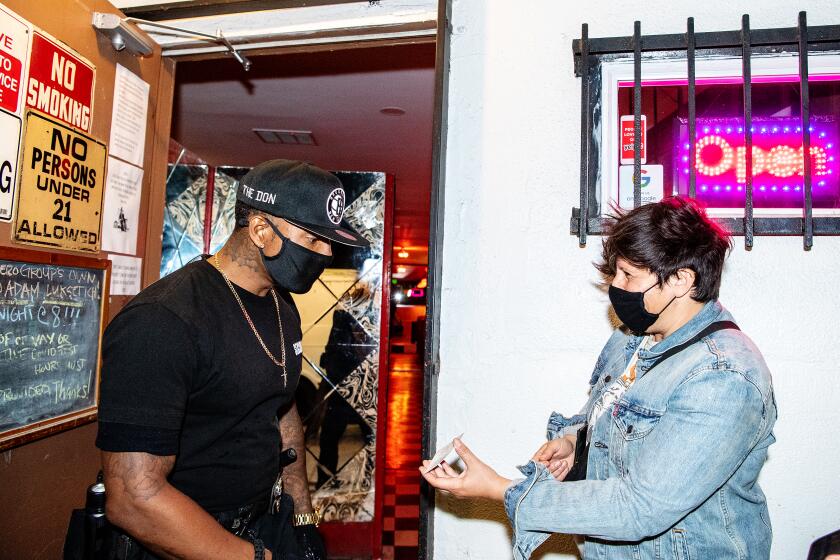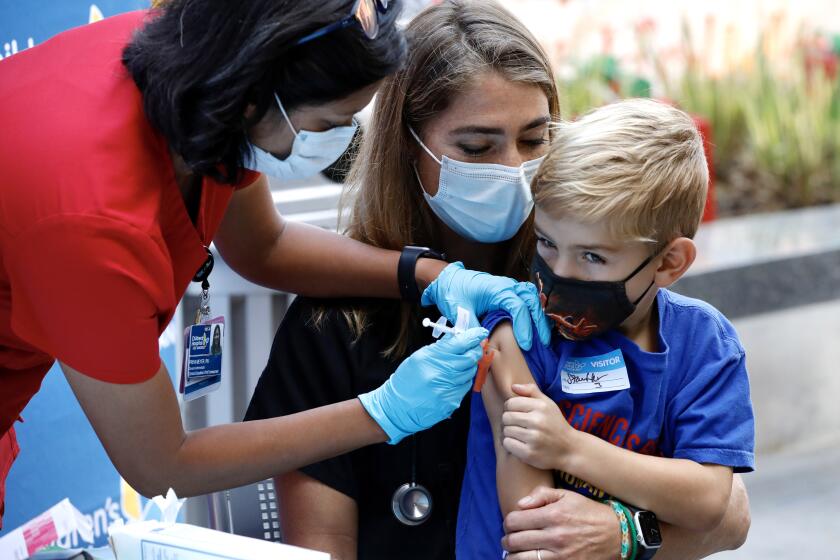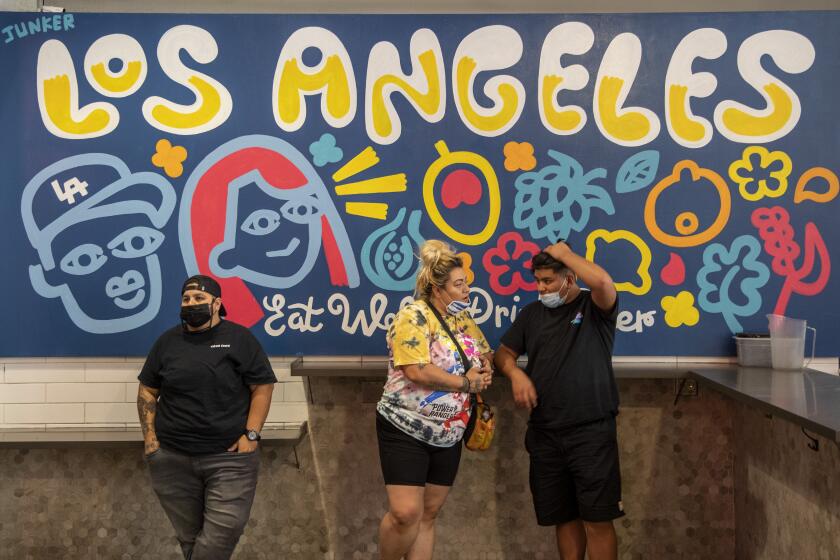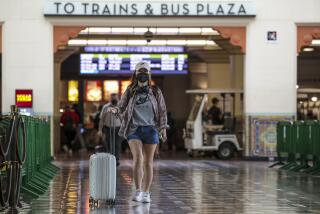Does your job description now include vaccine bouncer? This is what you need to know
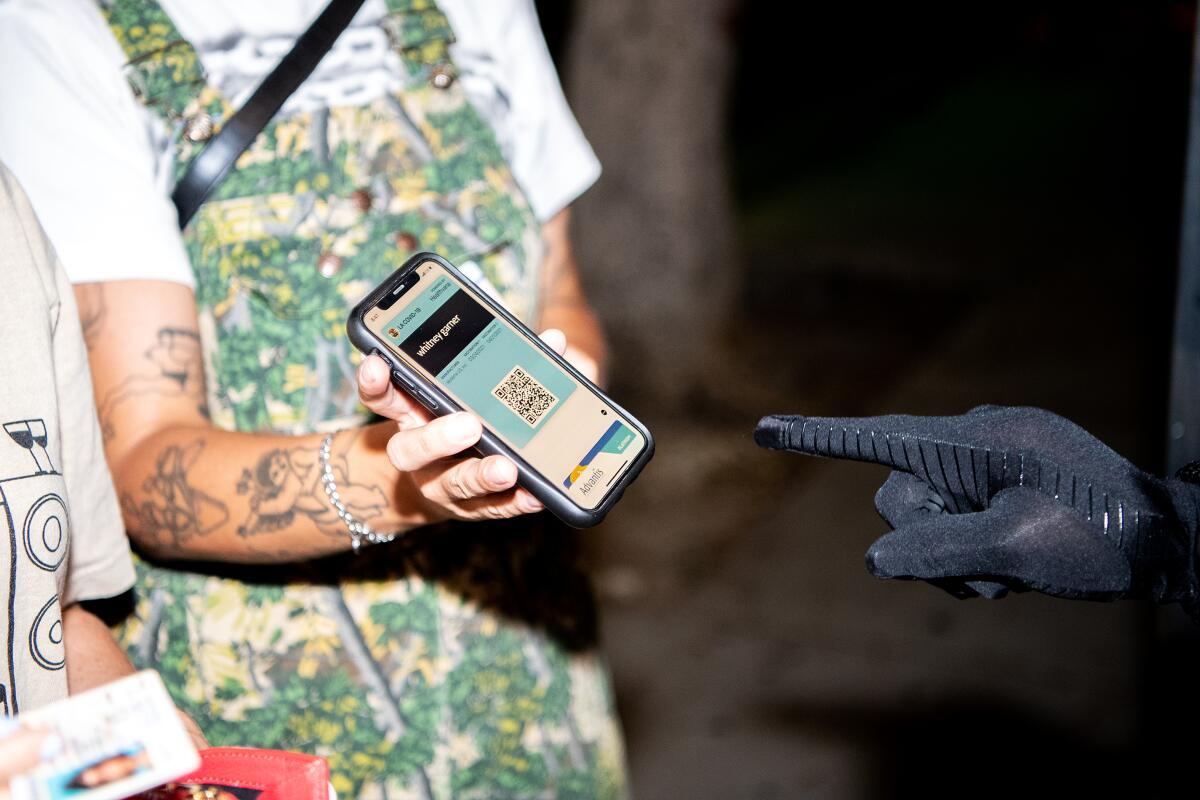
- Share via
Starting Thursday, nightclubs, bars, breweries, wineries, distilleries and lounges throughout Los Angeles County will have to deny indoor seats to people who can’t prove they’ve been fully vaccinated against COVID-19, under an order from county health officials.
And not long thereafter, a similar requirement will extend within the city of Los Angeles to restaurants, movie theaters, retailers and numerous other businesses that serve customers indoors, per a new city ordinance.
Many businesses are used to the idea of checking their patrons’ vaccination cards and digital proofs, having started doing so weeks ago. As of Oct. 7, bars and nightclubs in the county had to check to make sure patrons had been at least partially vaccinated or recently tested negative for the coronavirus.
And even before that, plenty of restaurants and bars implemented their own proof of vaccination policies, typically requiring customers to have received at least one COVID-19 vaccine dose or a negative test result.
(Since Oct. 7, the county also has required proof of full vaccination or a recent negative COVID test result for indoor “mega” events where 1,000 people or more are in attendance and outdoor “mega” events with crowds of 10,000 or more.)
Checking customers’ vaccination status has been a bridge too far for some businesses, most famously Irvine-based In-N-Out, which has declared itself unwilling to serve as the government’s “vaccine police.” Nevertheless, local health officials say they will inspect businesses to see which ones are complying and, eventually, fine the ones that are not.
At least businesses can now point to the city and county orders when demanding proof of vaccination from their customers. But they’ll get no help at the door from L.A. County deputies, Sheriff Alex Villanueva has said.
Instead, the responsibility to make sure customers abide by the vaccine rules will fall largely on each business itself. Nor does the county offer much advice for how to handle customers who get hostile when asked for proof of vaccination.
Here’s some guidance for businesses on how to comply with the latest requirements.
Around L.A., some businesses are asking for proof of vaccination against COVID-19 to enter. Here’s what you need to know about vaccination records.
How to verify COVID-19 vaccinations
The first step is to make sure the vaccination record being presented belongs to the person offering it. L.A. County’s guidance calls for businesses to cross-check the name on a record with a valid photo ID.
The next is to make sure the person is fully vaccinated. You’ll need to check both the number of doses and the date they were received, either on a physical vaccine card from the Centers for Disease Control and Prevention or on a digital vaccine card stored on a smartphone.
If the shot involved the Johnson & Johnson vaccine, verify that at least one dose was received, and that the initial dose happened at least 14 days beforehand. If the shot involved the Pfizer-BioNTech or Moderna vaccine, verify that the person received at least two doses, the second coming at least 14 days previously.
To check a vaccine record via QR code, businesses can download the free SMART Health card verifier app from The Commons Project Foundation to read the code on apps such as Carbon Health, CommonPass, or CLEAR Health Pass. Once the code is scanned, the app will show the same information as a physical or digital card (name, date, and type of dose), along with color-coded indicator about the trustworthiness of the information.
A green “verified” indicator at the top of the screen means that the information is genuine. A red “not verified” indicator means that the information is not valid. And an orange “partially verified” indicator means that the information is valid, but it came from a source that the app doesn’t recognize.
The “verified” indicator alone is not proof that a person is fully vaccinated — businesses still have to check the number and dates of the doses received. For example, according to Kathryn Tucker, chief marketing officer for The Commons Project Foundation, a person with a QR code from the State of California that documents only one dose of Moderna would show up as verified.
“While this does place some burden on the person using the app, we took this approach to provide flexibility to different rules and requirements around the US and the world,” Tucker said.
Businesses in the city of L.A. can accept a written exemption for medical reasons (which must be signed by a physician, nurse practitioner, or physician assistant) or religious beliefs (which requires only “a self-attestation that the patron has a sincerely held religious belief that qualifies the patron for the exemption,” according to the ordinance). However, the ordinance requires businesses to restrict those customers to outdoor facilities. They can enter an establishment only if they provide a recent negative COVID-19 test.
California officials launched an ambitious rollout Wednesday of COVID-19 vaccinations for kids ages 5 to 11.
What can an employee do if a customer refuses?
The county’s guidance regarding individuals who cannot or refuse to provide full proof of vaccination is to offer outdoor service if the facility is set up to do so.
Otherwise, Natalie Jimenez, L.A. County’s director of public affairs, said a business must decline to serve the customer indoors or not permit their entry “due to health and safety risks by unvaccinated persons being unmasked in a high-risk setting”.
When asked what guidance the county had for employees whose requests for proof of vaccination provoke an altercation with a customer, Jimenez said, “Employers should establish a process for employees to follow in deescalating conflicts with problematic patrons.”
How will the new rules be enforced?
Los Angeles County: To determine whether businesses are in compliance with the county’s order, Jimenez said, county inspectors will be visiting the establishments the order covers.
If an employee or a business repeatedly fails to check for proof of vaccination, she said, the business will receive an administrative citation for failure to implement the county order. An administrative citation carries a $500 fine and an additional fee for reinspection to verify ongoing compliance.
City of Los Angeles: The city of L.A. plans to conduct inspections to determine whether businesses are complying with the new ordinance. A business that doesn’t comply will receive a warning for the first violation, then a $1,000 fine for a second violation, $2,000 for a third, and $5,000 for the fourth and subsequent violations. Those fines won’t go into effect, however, until Nov. 29.
City of Long Beach: The city’s health order aligns with the county’s on vaccination requirements, with enforcement handled by the venues task force, said Jennifer Rice Epstein, Long Beach’s public affairs officer. In consultation with the city attorney, the city is permitted to discontinue municipal utility service to any business operating in violation of this order or force its closure for the duration of the order. A violation is a misdemeanor punishable by a fine of up to $1,000 and a jail term of up to 90 days. Long Beach’s chief of police is tasked with ensuring compliance with and enforcement of the public health order, and the city manager may call on other city employees to issue administrative citations, fines, and penalties.
City of Pasadena: Pasadena’s city health order also parallels the county’s, but with enforcement handled by the Pasadena Police Department. A violation of the order is a misdemeanor punishable by a fine of up to $1,000 and a jail term of up to 90 days.
Don’t expect face mask requirements to go away any time soon, because L.A. County’s metrics are strict.
More to Read
Sign up for Essential California
The most important California stories and recommendations in your inbox every morning.
You may occasionally receive promotional content from the Los Angeles Times.
